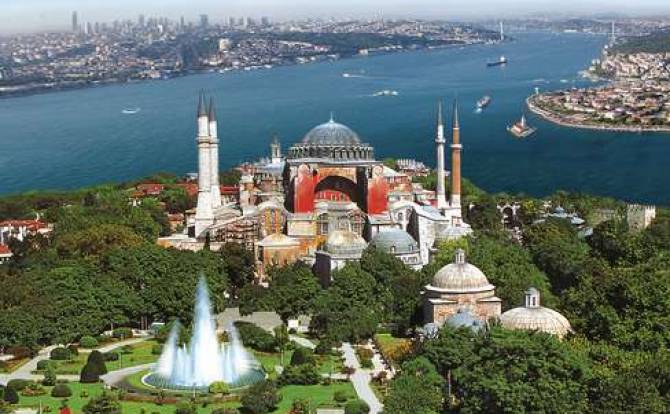The Turkish court ruling, on Thursday, July 10, and the decree issued by the Turkish president on changing the status quo of historical Hagia Sophia (which means holy wisdom), officially inscribed on UNESCO’s World Heritage List, received rampant reactions worldwide.
There are undeniable historical facts, and there are rights that must not be overlooked when dealing with a major event that totally transcends what has been claimed as a “local issue”, particularly based on the fact that Hagia Sophia is a “global issue”.
In this regard, the United Nations Educational, Scientific and Cultural Organization (UNESCO) says: “States have an obligation to ensure that modifications do not affect the Outstanding Universal Value of inscribed sites on their territories.” It stressed the importance “of effective, inclusive and equitable participation of communities and other stakeholders concerned by the property is necessary to preserve this heritage and highlight its uniqueness and significance. It is regrettable that the status quo of Hagia Sophia has changed. Furthermore, it is painful that religion was used to bring about political gains.”
Reverting to the Vatican message marking the advent of Ramadan month 2020, being the norm of the Vatican to convey well wishes to Muslims, it was addressed: “Christians and Muslims: Protecting Together the Places of Worship. It says, “As we all know, the places of worship occupy an important place in Christianity and Islam, and in other religions as well. For both Christians and Muslims, churches and mosques are spaces reserved for prayer, personal and communitarian alike. They are constructed and furnished in a way that favors silence, reflection and meditation. They are spaces where one can go deep in himself/herself, so favoring for God-experience in silence. A place of worship of any religion therefore is “a house of prayer”.
Reverting also to the historic “Document on Human Fraternity for World Peace and Living Together” signed in Abu Dhabi by His Holiness Pope Francis and Grand Imam of Al-Azhar Sheikh Ahmad Al-Tayyeb, the document stresses that ‘the protection of places of worship– synagogues, churches and mosques–is a duty guaranteed by religions, human values, laws and international agreements. Every attempt to attack places of worship or threaten them by violent assaults, bombings or destruction, is a deviation from the teachings of religions as well as a clear violation of international law.”
The Middle East Council of Churches which consists for four Middle Eastern Churches (the Orthodox Church, the Catholic Church, the Oriental Orthodox Church and the Anglican Church) stresses that the Turkish decision “is an assault on religious freedom, the freedom that has become the cornerstone in international consciousness and that is protected by international laws.” It adds that, “by this decision, the whole world is called upon to stand together and conscientious, and calls on the societal and religious authorities living in Turkey to get mobilized at all levels to put an end to this aggression and transgression in a way that preserves the true meaning of coexistence in all its profundity.”
In conclusion, we reiterate Pope Francis’ words by expressing sadness for what happened as it impacts the sublime plurality. Yet, in Jordan, we are proud of the mutual respect between Muslims and Christians, and we are proud as well of the sublime initiatives that our country has issued and have become significant references to interfaith dialogue.
We are also proud of the Hashemite custodianship of the Islamic and Christian holy sites. We do not forget that His Majesty King Abdullah II contributed to the restoration of the Church of the Holy Sepulcher.
After being awarded the 2018 Templeton Prize in Washington, His Majesty the King said that he would present this award for the sublime religious dialogue initiatives.
May God protect Jordan, the national unity, and the human brotherhood in the entire world.
By: Fr. Dr. Rif’at Bader
Source: abouna.org






